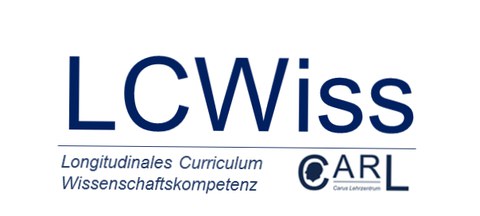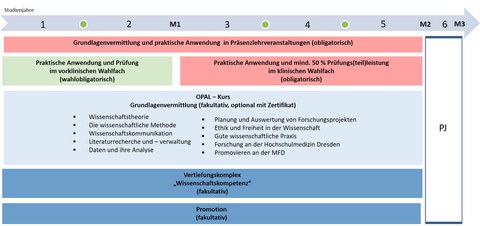Cross-faculty projects
The Carus Teaching Center compiles innovative teaching-related projects initiated at our faculty. If you would like to present a project yourself or have any questions about the projects, please contact the academic coordinator.
Table of contents
Digitization
Digitalization plays a major role in both teaching and student administration. Our faculty develops and implements innovative digital teaching concepts and promotes approaches to make administrative processes in teaching as simple and automated as possible.
TelePräsenz is a sub-project of the virTUos ( virtual teaching and learning at TU Dresden in an open source context) project successfully acquired by TU Dresden in 2021, which is funded by the Foundation for Innovation in University Teaching (StIL) with a total of €2.7 million until the end of 2025.
In telepresence, the main focus is on the aspect of inclusive distance learning within the framework of existing practical teaching formats. The establishment of a new place of learning through the use of telepresence robots opens up a wide range of opportunities for students to participate in teaching/learning processes. Learning thus becomes more flexible and less dependent on a fixed learning location. This not only makes the teaching of practical skills more efficient and inclusive, but also promotes the development of digital skills among students.
Project management: Prof. Dr. Ingo Röder
Contact person: Ms. Marie-Christin Willemer
HybParc is a sub-project of the virTUos ( virtual teaching and learning at TU Dresden in an open source context) project successfully acquired by TU Dresden in 2021, which is funded by the Foundation for Innovation in University Teaching (StIL) with a total of €2.7 million until the end of 2025.
In HybParc, hybrid interactive self-learning, training and examination courses are being developed, which will be used within the existing teaching of an established medical-interprofessional context. With the help of video recordings and sensor data, a (partially) automated analysis of action sequences is made possible and learners are given feedback on the performance of the corresponding practical skill. The aim is to give students the opportunity to use individual training and self-learning opportunities according to their own potential and deficits and also to develop digital skills.
Project management: Prof. Dr. Ingo Röder
Contact person: Marie-Christin Willemer
Students have to attend a large number of compulsory courses during their studies. In some cases, attendance is still recorded using paper lists or paper test cards. In 2023/24, a pilot project was carried out with an external company to digitize attendance recording using a QR code-based variant. Many hurdles led us to the currently simple solution of digital attendance recording using Moodle. In addition to simpler handling and saving paper, we also expect this to have positive effects in terms of time and personnel resources.
Contact person: Dr. Doreen Pretze
Curriculum development
Medical studies are constantly evolving. Curricula are also being redesigned accordingly. An important focus is the development of longitudinal curricula.
An interdisciplinary project group has set itself the task of establishing and mapping a longitudinal curriculum of communicative and social skills. All relevant specialist areas are to be included and appropriate teaching and assessment methods are to be used.
Contact: Prof. Dr. med. Kerstin Weidner
To strengthen scientific skills in medical studies, a longitudinal curriculum (LCWiss) is being established at the Faculty of Medicine with the aim of enabling independent scientific thinking, working and acting in accordance with the NKLM (2015). The course is designed as a blended learning approach/integrated learning format (face-to-face events combined with e-learning). In addition to the development of a virtual basic course in OPAL, which will be available to all students of the Faculty of Medicine at any time, existing face-to-face courses on the subject of scientific competence will be identified through curricular mapping with LOOOP and assigned to the longitudinal strand in terms of content. Elective subjects, which serve to promote inclinations during studies, supplement the offer. In the medium term, the aim is to create an optional specialization in "scientific literacy", which will allow students to focus on specific areas during their studies. In the future, this could form the methodological basis for the academic work of all students, which must be completed as part of the specialization areas envisaged by the new AO.
In the fall of 2022, a student research working group was founded to investigate the topic of teaching medical-scientific skills during medical studies as a core research area.
Contact person: Dr. Lydia Günther (project coordinator)
The additional courses offered in the optional specialization complexes (fVK) offer interested students an individual focus in their studies and the opportunity to deal in depth with specific medical or medically relevant topics.
Lecturers from a wide range of departments have developed concepts for these intensive courses of at least 90 units. The curricular organization varies greatly and ranges from the bundling of several elective courses during the course of study to spring schools with subsequent courses during the semester. An OPAL course provides an overview of all the electives currently on offer. All participants receive the Dresden Additional Certificate (D2Z2)from TU Dresden as proof and after successfully completing the course.
The fVK are basically independent of the regular elective courses, which are part of the compulsory curriculum in the state examination course in medicine in accordance with the licensing regulations. Nevertheless, some elective subjects are integrated into the VCs, so that their registration formalities must be observed accordingly.
Contact person: Dr. Lydia Günther
In order to promote early "entry" into clinical practice and early professional personal support in the curriculum, the Staff Unit for Didactics and Teaching Research has developed a mentor-based job shadowing program for students from the first clinical semester.
The mentoring program developed within a MeDDrive project creates a teaching/learning situation "in vivo" between students and medical colleagues in the UKD/teaching hospitals/teaching practices in the sense of model learning according to Bandura. The aim of the program is to promote teaching concepts that are more competence-oriented and closer to practice, as called for in the Master Plan 2020.
Students are given the opportunity to contact a mentor of their choice via an online platform and arrange a work shadowing appointment at the mentor's clinical practice. On the work shadowing day, students then accompany the mentor on the ward and receive background information on the range of work and skills from the mentors. The focus is on personal supervision by a specialist expert, whereby the interactive approach enables an in-depth examination of the specifics of the specialist area and the specialist requirements profile. The mentoring program allows students to get to know various specialist areas in the "real-live" ward/outpatient clinic of their choice under supervision outside of clinical placements, compulsory internships and PJ tertials.
We hope that the 1:1 supervision will give students the opportunity to gain a differentiated insight into the respective section of the department. In addition, further contacts with the mentor can of course be established and joint projects can be planned (longer internship - clinical traineeship, doctoral thesis, etc.). All offers can be found in the ePortal.
Contact person: Dr. Annette Strumpf




